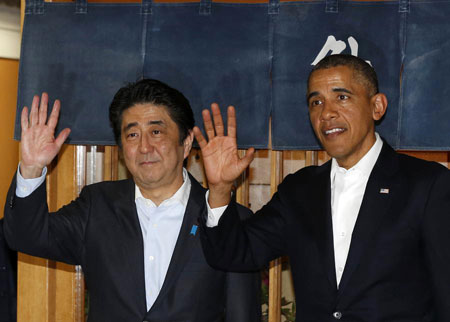|
 |
| U.S. President Barack Obama (R) waves next to Japan's Prime Minister Shinzo Abe after dinner at Sukiyabashi Jiro restaurant in Tokyo, April 23, 2014.[Photo/Agencies] |
The US president should persuade Japan's right-wingers of the error of their ways during his trip to the region to ensure stability
After undergoing nearly seven decades of development since the end of World War II, Asia has already taken on a new look, witnessing not only the rise of a group of industrialized countries and regions during the latter part of the 20th century, but also the emergence of a number of economies that have grown to be the engine of global economic growth in the new century.
However, Asia's development is still unbalanced.
First, Asia's political cooperation is out of step with its economic dynamism. Political trust, particularly in East Asia, is still severely lacking. The actions and comments of Japanese right-wingers, who go so far as to complain of injustice when it comes to the Tokyo Trials and try to strengthen the country's control of territory it annexed illegally during its imperialist past, have undoubtedly sown the seeds of deep mistrust among East Asian countries.
Second, in the context of the strained relations between some countries in the region, some Western media have been hyping speculation that the Asian economy might slow further. It is true economies in East Asia have recently experienced moderate or medium-speed growth after years of high-speed expansion. But this tendency is in line with the law of development, and also is connected to the fatigued global economy. Even so, the development speed of Asia's emerging economies still far exceeds that of Western developed countries, and their momentum is increasingly reshaping the global landscape.
Because of the existence of various rifts and the lack of mutual trust, the region is in desperate need of candid dialogue. The trust deficit in Asia has affected the progress of regional economic cooperation, but at the same time it also suggests that there is great potential for further economic, investment and trade cooperation in the region, including the construction of regional free trade areas.
Asia needs to accumulate constructive positive energy, give full play to the spirit of countries being in the same boat, and effectively alleviate regional tensions to change the negative factors into positive elements. Moreover, Asia should oppose any shortsighted actions to set up small cliques.